7 September 2022 In Active Mobility, Africa, Blog Post, News
Creating a better future with Dakar’s Sustainable Urban Mobility Plan
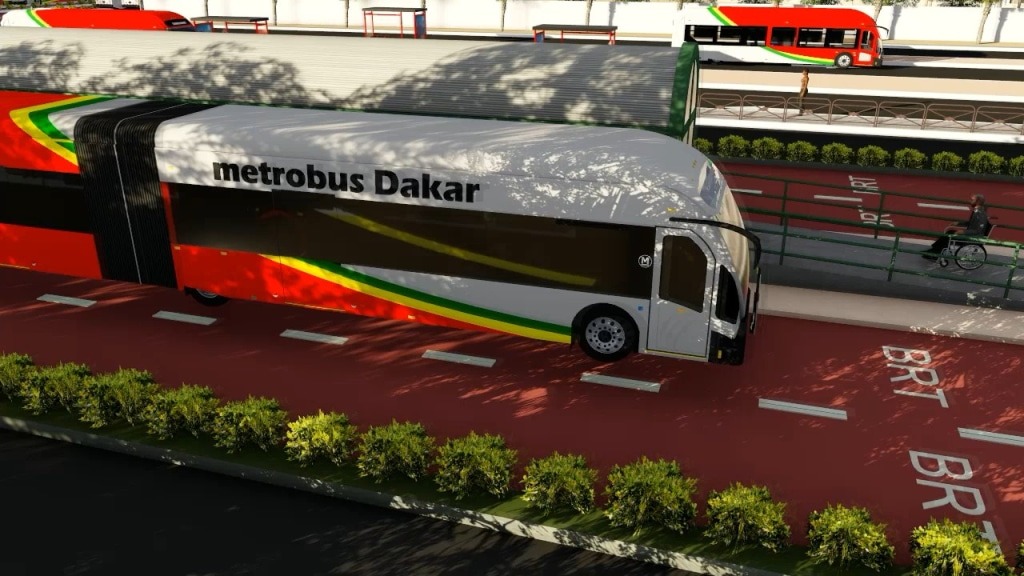
Dakar, Senegal, is one of the fastest growing cities in Africa, with about 4 million inhabitants which accounts for 23% of the country’s total population. Its population is expected to reach 5 million by 2030. Along with rapid population growth comes a strong increase in travel demands and greater needs for access to residential areas, employment, trade, services, etc.
For many, commuting from suburbs to the city centre is an important component of their day-to-day mobility needs. Even if the development of the urban centres such as Diamniadio and Lac Rose can lead to less polarised flows towards the Plateau, daily trips to the centre are expected to increase in the years to come due to demographic growth and the motorisation of households. On average, 7.2 million daily trips are made in the urban area (EMTASUD 20151). Dakar’s mobility system is struggling to keep up with the increasing demands, which results in significant dysfunctions, such as:
- Poor walking conditions (accounting for 70% of trips) for pedestrians;
- Road congestion, which compromises the efficiency of public transport systems;
- Low mode share of cycling due to the lack of dedicated bike lanes and related services (e.g. bike sharing);
- Traffic-related accidents and air pollution.
Fortunately, Dakar’s mobility system is currently undergoing significant transformation with its new Train Express Regional (opened in December 2021), its first Bus Rapid Transit (under construction) line, the planned restructuring of its public transport network and the construction of other transport infrastructures. However, in order to meet long-term travel demand, it is necessary to continue efforts to improve Dakar’s mobility system as a whole. Indeed, by 2035, if current trends continue, nearly 14.5 million trips will be made on average per day – which will have doubled compared to 2015. Mode share of public transport may also decrease due to the increasing motorisation of households, causing significant negative external effects on the planet and people’s health.
In order to respond in a sustainable manner to these challenges, CETUD is currently developing a Sustainable Urban Mobility Plan (SUMP) for Dakar to change its motorisation trajectory while taking into account climate issues. This SUMP takes a multistakeholder participatory approach and is based on a new vision for multimodal mobility, emphasising efficient, high-capacity public transport, incremental introduction of clean vehicles, and walking and cycling as a backbone to the system. The SUMP is expected to reduce Darkar’s transport CO2 emissions by around 15% by 2035 compared to the current situation. This objective is in line with the Paris Agreement and will contribute to the achievement of the Sustainable Development Goals of the 2030 Agenda for Sustainable Development (SDG 11 – Sustainable Cities and SDG 13 – Climate Action).
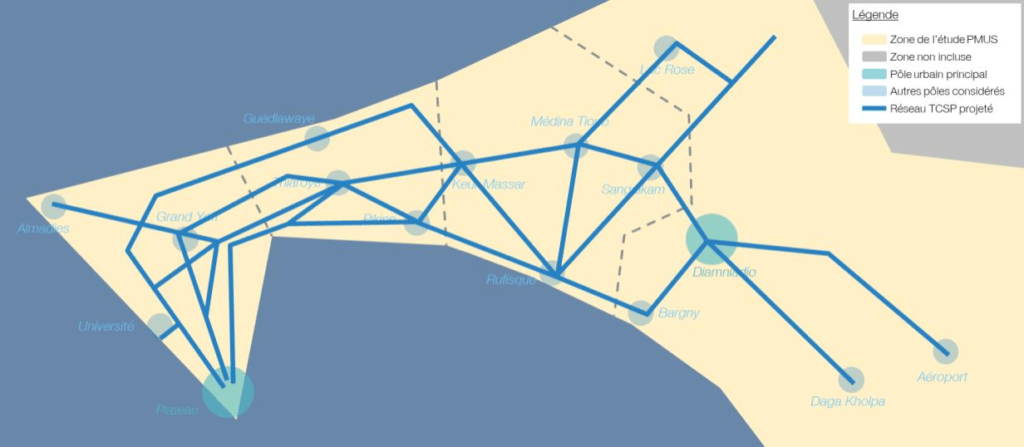
With COP27 to be held in 2022 in Egypt, we see great opportunities to rethink the real and urgent challenges of Dakar’s transport and mobility system. We look forward to seeing how this important occasion can better facilitate meaningful exchanges on innovative solutions adapted to the context of African countries. The results of these reflections will surely enrich the proposals of Dakar’s SUMP and better align it with Senegal’s commitments to achieve the Paris Agreement.
—
1EMTASUD 2015 : Enquête-ménages sur la Mobilité, les Transports et l’Accès aux Services urbains dans l’Agglomération de Dakar réalisée par le CETUD en 2015.
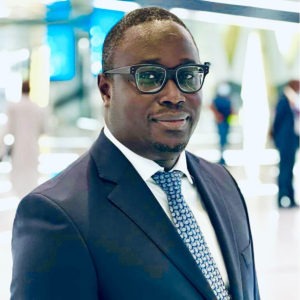
Thierno Birahim AW
Thierno Birahim AW holds a PhD in Transport Economics from the Ecole Nationale des Ponts et Chaussées - Université Paris Est. He has 18 years of professional experience in the field of transport and mobility in urban and regional environments. He has been in charge of conducting complex studies and research for the public and private sectors, analysing and presenting strategic recommendations, and assisting public authorities in the implementation of their projects. This work includes regular interactions with public decision-makers, managers and operational teams. Since 2016, he is the Director General of the Executive Council for Sustainable Urban Transport (CETUD).
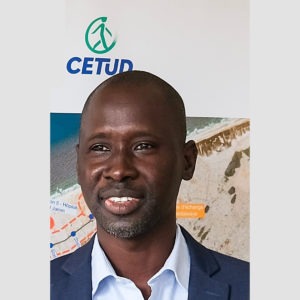
Khadim CISSE
Khadim CISSE is a civil engineer specialising in transport, urban mobility and development. He has 15 years of experience in transport. First, he was a senior transport engineer at NOVEC Consulting Engineers in Morocco. In 2017, he joined the Executive Council for Sustainable Urban Transport (CETUD) where he is currently Director of Studies and Strategy. In this capacity, he contributes to the development of urban mobility policies and strategies in Dakar and pilots several major projects such as the Global Restructuring of the Dakar Public Transport Network and the Sustainable Urban Mobility Plans (SUMP) of the Dakar and Mbour agglomeration.
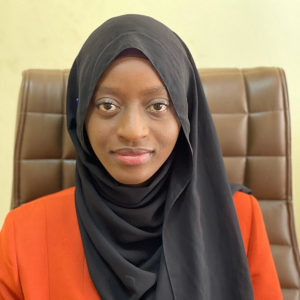
Ndeye Rokhaya DIENG
Ndeye Rokhaya DIENG is a Civil Engineer with 5 years of professional experience in the field of transport and mobility in urban areas. She started her career at the World Bank where she worked with the Africa Transport Policy Program (SSATP). In 2018, she joined the Executive Council for Sustainable Urban Transport (CETUD) as a civil engineer before taking up the position of Head of the General and Technical Studies Division. Thus, she contributes to the implementation of several studies and projects including the Sustainable Urban Mobility Plan (SUMP) of Dakar and the Global Restructuring of the Dakar Public Transport Network.

Thierno Birahim AW
Thierno Birahim AW holds a PhD in Transport Economics from the Ecole Nationale des Ponts et Chaussées - Université Paris Est. He has 18 years of professional experience in the field of transport and mobility in urban and regional environments. He has been in charge of conducting complex studies and research for the public and private sectors, analysing and presenting strategic recommendations, and assisting public authorities in the implementation of their projects. This work includes regular interactions with public decision-makers, managers and operational teams. Since 2016, he is the Director General of the Executive Council for Sustainable Urban Transport (CETUD).

Khadim CISSE
Khadim CISSE is a civil engineer specialising in transport, urban mobility and development. He has 15 years of experience in transport. First, he was a senior transport engineer at NOVEC Consulting Engineers in Morocco. In 2017, he joined the Executive Council for Sustainable Urban Transport (CETUD) where he is currently Director of Studies and Strategy. In this capacity, he contributes to the development of urban mobility policies and strategies in Dakar and pilots several major projects such as the Global Restructuring of the Dakar Public Transport Network and the Sustainable Urban Mobility Plans (SUMP) of the Dakar and Mbour agglomeration.

Ndeye Rokhaya DIENG
Ndeye Rokhaya DIENG is a Civil Engineer with 5 years of professional experience in the field of transport and mobility in urban areas. She started her career at the World Bank where she worked with the Africa Transport Policy Program (SSATP). In 2018, she joined the Executive Council for Sustainable Urban Transport (CETUD) as a civil engineer before taking up the position of Head of the General and Technical Studies Division. Thus, she contributes to the implementation of several studies and projects including the Sustainable Urban Mobility Plan (SUMP) of Dakar and the Global Restructuring of the Dakar Public Transport Network.